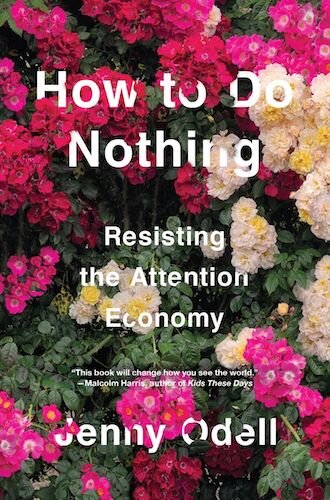How to do Nothing - Jenny Odell
Resisting the Attention Economy
[bq] “Already in 1877, Robert Louis Stevenson called busyness a ‘symptom of deficient vitality’.”
1. The Case for Nothing
[bq] “’Nothing’ is neither a luxury nor a waste of time, but rather a necessary part of meaningful thought and speech.”
If you pursue something like listening to birds, initially it will be just random noises. But after a while you’ll start hearing very clear distinctions. Same when focusing on learning to taste e.g. coffee or wine.
Compares this to learning a foreign language.
Defines “doing nothing” as refusing productivity and stopping in order to listen. It does contain an active process of listing.
It offers repair and a sharpened ability to listen, as well as “an antidote to the rhetoric of growth.”
[bq] “In the context of health and ecology, things that grow unchecked are often considered parasitic or cancerous. Yet we inhabit a culture that privileges novelty and growth over the cyclical and the regenerative.”
[bq] “We do not tend to see maintenance and care as productive."
[q] “Longest is the life that contains the largest amount of time-effacing enjoyment.”
- John Muir
Recommends “Deep Listening”: For her in particular, that’s listening to birds, ideally while sitting in her local rose garden.
2. The Impossibility of Retreat
Laments that almost always people see rest and retreats as something to make you more productive when you’re back to whatever you were doing, not an end in themselves.
Says we need to distance ourselves from the fast news cycles of social media, built on anger and outrage.
Should choose “standing apart”, taking the view of the outsider without actually leaving.
3. Anatomy of a Refusal
Interesting piece by Finish artist Pile Takala: “The Trainee”: Got a job at Deloitte and then just sat around saying she’s thinking.
4. Exercises in Attention
Looking, truly looking at the world, is a skill that few people regularly practice. Same with hearing. We often just blend out the visuals and sounds, but if we slow downs to take them in there is lots of beauty to be found.
[bq] “How endlessly strange reality is when we look at it rather than through it.”
Attention is changing and adaptable, it gets “rendered”. As Odell got into bird watching she started noticing birds everywhere. Events of interest can re-map our attention.
Comparing it to 3D modelling where you don’t know what the outcome looks like until you render it:
[bq] “When the pattern of your attention has changed, you render reality differently. You begin to move and act in a different kind of world.”
5. Ecology of Strangers
We live in our own bubbles, meeting and spending time with people much like ourselves. But there is great value in spending time with strangers, e.g. random neighbours. The lack of shared context makes you explain yourself and see things in a new light.
We experience “species loneliness”. We lost touch with the animals around us, no longer know their names and behaviours, or even notice them at all.
[bq] “A community in the thrall of the attention economy feels like an industrial farm, where our jobs are to grow straight and tall, side by side, producing faithfully without ever touching.”
Compares our thinking/culture to agricultural monocultures, which produce a lot, but are not very resistant to disease.
6. Restoring the Grounds for Thought
We live in a world of “context collapse”. Sharing snippets on the Internet without much context makes it harder for people to understand our intent and as a result we become cautious and share versions that are sort of appropriate and suitable for every audience.
Better: say the right things to the right people/group, instead of widely broadcasting a vanilla version of your message.
[bq] “What if we spent less time shouting into the void and being washed over with shouting in return - and more time talking in rooms to those for whom our words are intended.”
This could be a real physical room or a group chat on e.g. Signal. But it restores context.
Conclusion: Manifest Dismantling
Must shift our view from conquerer of the land to member and citizen of it. Might even have to undo/deconstruct some of our past mistakes and damages.
